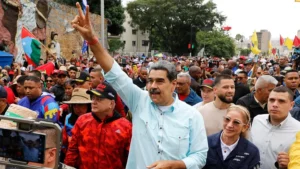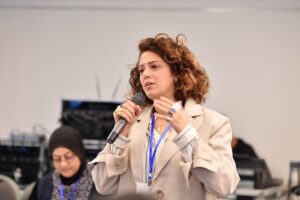
Legitimacy of the Palestinian People’s Struggle for Freedom and Self-Determination Under lnternational Law
The humanitarian crisis in Gaza epitomises t h e protracted colonial subjugation of Palestinians since the Nakba of 1948, marked by systemic displacement, settler colonialism, apartheid, and the denial of sovereignty. This report situates Palestinian resistance within the framework of international law, asserting its legal legitimacy as a response to decades of colonialism.

Legal Analysis of the Provision of Humanitarian Assistance to the Palestinian Population of Gaza by the International Freedom Flotilla Under International Law
The undersigned counsel finds that under all relevant principles and codes of international law, that the passengers of the vessels of the International Freedom Flotilla (Flotilla), flying, respectively, under the flags of Guinea-Bissau, and Palau are entitled to protection for their free and safe passage to Gaza for the purpose of delivering life-saving and humanitarian aid materials to Palestinians in Gaza.

Boğaziçi University International Law Conference - Justice and Reconstruction in Post-Conflict Societies
BILC 2025 aims to evaluate the impact of international law on justice and reconstruction processes in post-conflict societies. The conference seeks to discuss the contributions and limitations of existing structures of international law to justice and sustainable peace, focusing on case studies such as Syria, Ukraine, Afghanistan, and Palestine.

Conference on International Law Politics and Memory – 30th Anniversary of the Srebrenica Genocide
The year 2025 marks the 30th anniversary of two pivotal events that have shaped the modern history of Bosnia and Herzegovina and the broader Balkan region: the Srebrenica Genocide and the Dayton Peace Agreement.

Dayton Conference Announcement
This Conference on International Law, “The Dayton Agreement at 30: Legal Reflections, Politics of Fragmentation and the Future of Peacebuilding” invites scholars, legal practitioners, policymakers, and researchers to submit papers exploring the legal…

Comprehensive Report Of Human Rights In Uzbekistan: Reforms And Violations
Uzbekistan has implemented a series of legal and institutional reforms in recent years in the field of human rights. The government has taken various steps aimed at improving the legal system, promoting economic and social development…

Worldwide Lawyer Education Program
The Worldwide Lawyer Education Program is a comprehensive, in-depth and new-focused program specially developed for those who want to conduct studies in the field of international law. Various activities such as lectures, workshops, current issues sessions…

The Failures and Futures of International Law
Recent conflicts in Gaza and Ukraine have highlighted profound challenges to the foundations of international law and the effectiveness of global institutions. These conflicts underscore a trend of growing disregard for international norms, prompting a critical…

International Lawyers, and Legal and Civil Society Organizations...
On 28 August 2024, an official letter was submitted to the President of the UN Human Rights Council, H.E. Amb. Omar Zniber (Permanent Representative of Morocco to the UN in Geneva), by the PAL Law Commission, Euro-Med Human Rights Monitor…
Join Us
Join Us
Join WOLAS’ Global Network of Lawyers
You can join WOLAS’ global network of lawyers in order to advocate for human rights, the rights of nature, and animal rights by contacting your elected officials, and by speaking out against human rights abuses, environmental abuse, and animal abuse. Please contact info@wolas.org.

Who are we?
Worldwide Lawyers Association
Worldwide Lawyers Association (WOLAS) was established in 2016 by lawyers and academics working in Turkiye, with the aim of conducting activities in the international arena. It is open to individuals who advocate for rights, and its main focus is advocating for rights. Protecting the rights of individuals against both major and minor authorities is one of the association’s primary objectives. In pursuit of this goal, WOLAS adopts an approach that constantly questions the assumptions and blind spots in the understanding of human rights, renewing them with a demand for a more holistic and inclusive concept of justice.
Method of Operation
Monitoring
WOLAS Monitoring Unit carries out both situation-based and case-based human rights monitoring activities in order to understand whether the legislation and practices of any country comply with international standards or norms.
Reporting
WOLAS Reporting Unit is the Unit that works in close coordination with the Monitoring Unit and prepares reports and information notes on human rights violations by processing reliable data from the Monitoring Unit.
Legal Operations
The main purpose of the Legal Operations Unit is to make the necessary applications by using the International and/or Regional Human Rights Protection Mechanisms through the lawyer in the charge in the relevant country within WOLAS
Education
The Education Unit operates in order to increase the number of people advocating for rights in Turkiye and in the world, to convey the necessary knowledge and experience to those who are interested in advocacy
News

Statement on the Escalated Sentence Imposed on Rached Ghannouchi
The Worldwide Lawyers Association (WOLAS) condemns the reported decision of the Tunis Court of Appeal

No Sanctions by Force, No Law by War
WOLAS Statement on the United States’ Aggression Against Venezuela and the Abduction of President Maduro

Statement of WOLAS on the Unlawful Disciplinary Sanctions Imposed on Attorney Maha Ighbaria
Statement of WOLAS on the Unlawful Disciplinary Sanctions Imposed on Attorney Maha Ighbaria Worldwide Lawyers

